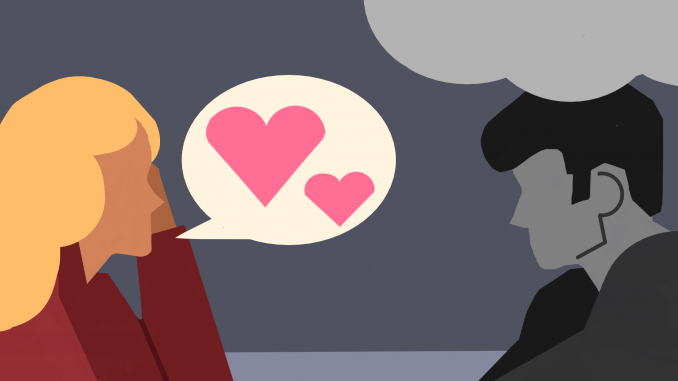
Emily Foster, a junior history major, said she noticed codependent behavior in a relationship with a previous girlfriend, which Foster said was “not a healthy relationship.”
“I started defining myself as a person by what I could do for her, how I could help her, so part of my identity became connected to supporting her,” Foster, who has mental health issues, added. “I became her outlet for everything that was going on in her life, which was a strain on me.”
Intimate relationships might be social connection most affected by mental illness, and unhealthy dynamics, like codependency, can sometimes manifest within couples suffering from mental health issues, Psychology Today reported.
In the past year, 65.7 percent of students suffered from overwhelming anxiety and 45.1 percent of students felt so depressed that it was difficult to function, according to a 2019 survey from the National College Health Assessment by the American College Health Association.
Janie Egan, the mental well-being program coordinator at Temple University’s Wellness Resource Center and a certified health education specialist, said mental health can sometimes add a new layer of difficulty to relationships.
“I think navigating relationships is challenging, and so is mental health,” Egan said. “These are two challenging things that, when viewed separately, can be difficult to deal with, but adding the two together adds another level of complicated.”
Maintaining self-care practices and communicating boundaries in relationships is important for mental health, Egan said.
‘“When it comes to dating or exploring new relationships, it’s important to consider what’s important to them and how they can still practice self care,” Egan added.
Egan explained that boundary setting is part of this practice.
“Making sure we are doing what feels right for us, and that means communicating a boundary with someone, which can be uncomfortable, but it can also be helpful for our mental well-being to do that,” she said.
Foster’s main concern when it comes to dating is when to open up about her mental illness, she said.
“It’s this weird balancing act you have to have,” Foster added. “On one hand, you don’t want to waste your time with someone who, when you’re open about your mental health, they’re gonna drop you like a bag of rocks. But at the same time…I don’t want [my mental health] to be the only defining thing they know about me.”
The National Alliance on Mental Illness’s resource page states there are typically three paths that romantic partners can take when a person discloses their condition: they are “genuinely comfortable” and “things stay the same”; the person ends the relationship, or the person is supportive initially, but soon pulls away.
Egan advises building trust and “cultivating relationships where [partners] can communicate openly and without judgment” before opening up about something you’re suffering from or going through.
“Trust is important when it comes to disclosing our mental health concerns,” Egan said. “If folks are in a relationship where they feel judged or can’t be their authentic self, that’s where we can do some self-reflection and communicate that.”


Be the first to comment